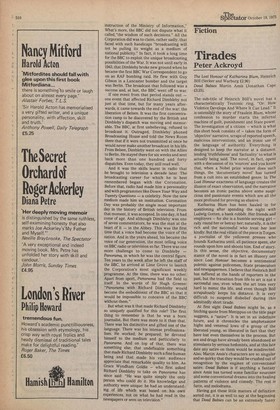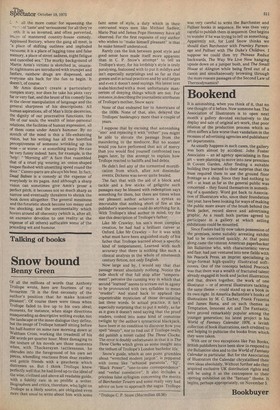Fiction
Tirades
Peter Ackroyd
The Lost Honour of Katharina Blum, Heinrich Boll (Secker and Warburg £2.90)
Dead Babies Martin Amis (Jonathan Cape £3.25).
The sub-title of Heinrich Boll's novel has a characteristically Teutonic ring, "Or: How Violence Develops And Where It Can Lead." It is ostensibly the story of Fraulein Blum, whose confession to murder starts the infernal
machine of guilt, punishment and State power. The investigation of a citizen — which is what this short book consists of — takes the form of 'objective' narrative, scraps of reported speech, malicious interventions, and an ironic use of the language of authority. Everything is designed to keep the narrator at a distance, lending 'truthfulness' and 'factuality' to what is actually being said. The novel, in fact, opens with a discussion of its 'sources' and you know that, when a Nobel prize winner does such things, the 'documentary novel' has turned from a cult into an established genre. In The Lost Honour exactness of language creates the illusion of exact observation, and the narrative becomes an ironic patina above some suspicious and passionate events which are all the more profound for proving so elusive.
Katharina Blum has been hauled in for questioning after spending the night with Ludwig Gotten, a bank robber. Her friends and employers — for she is a humble serving girl — rally round her or betray her; naturally, it is the rich and the successful who treat her less kindly. But the real villain of the piece is Totges, a journalist of the yellowest presses who hounds Katharina until, all patience spent, she • rounds upon him and shoots him. End of story. In this sense, the objective, documentary stance of the novel is in fact an illusory one since Lost Honour becomes a sentimental polemic against policemen, State prosecutors and newspapermen. I believe that Heinrich Boll has suffered at the hands of reporters in the past, but the transition from life to art is not a successful one, 'even when the art tries very hard to mimic the life, and even though Boll scrupulously keeps his distance. It is very difficult to suspend disbelief during this admittedly short tirade.
At first sight Dead Babies might be, as a fetching quote from Menippus on the title page suggests, a "satire". It is set in an indefinite future, and it chronicles the amphetamine highs and venereal lows of a group of the liberated young, so liberated in fact that they have lost even themselves in the process. But sex and drugs have already been abandoned as stimulants by serious hedonists, and at this late date any satire on them would be misdirected. Also, Martin Amis's characters are so singular and so quirky that they would be crushed out of recognition by the engines of conventional satire. Dead Babies is if anything a fantasy since Amis has turned some familiar neuroses and some conventional dreams into the healing patterns of violence and comedy. The rest is farce, and melodrama.
Having got these little matters of definition sorted out, it is as well to say at the beginning that Dead Babies can be an extremely funny all the more comic for squeezing the of 'taste' and 'seriousness' for all they're
,.)rth. It is an inverted, and often perverted, im,..Fre of mannered country-house comedy. Appleseed Rectory, where the gang all meet, is "a place of shifting outlines and imploded vacuums; it is a place of lagging time and false memory, a place of street sadness, night fatigue and cancelled sex." The murky background of Martin Amis's victims is sketched in, onanistic nightmares are introduced with trumpet and fanfare, rainbow drugs are dispensed, and everyone sits back for the fun to begin. It doesn't, of course.
Mr Amis doesn't create a particularly complex story, nor does he take his plots very far or very fast, and the brunt of his comedy lies in the clever manipulation of language and the general sharpness of his descriptions. All human aspirations, all of Man's little decencies, the dignity of our procreative functions, the life of our souls, the wealth of inter-personal relations, the facilities of human expression, all of them come under Amis's hammer. By no stretch of the mind is this a life-enhancing vision, but his writing has all the horrified perceptiveness of someone wrinkling up his nose — or worse — at something nasty. He can be very funny indeed: here, for example, is the 'help': "'Morning all!' A face that resembled that of a cruel pig wearing an onion-shaped toupee flashed with unsettling speed round the door." Cameo-parts are always his best. In fact, Dead Babies is a comedy at the expense of everybody in its pages. And although a sharp vision can sometimes give Amis's prose a perfect pitch, it becomes not so much sharp as narrow and eventually threatens to shrink the book down altogether. The general messiness and the futuristic shock become too messy and too shocking, and the sentimentality which hovers around all obscenity (which is, after all, an excessive devotion to one reality at the expense of all others) suffocates some of the preceding wit and humour.



































 Previous page
Previous page